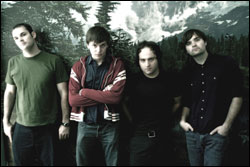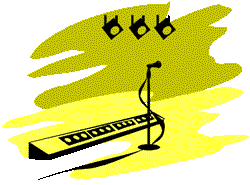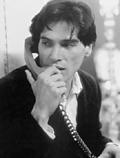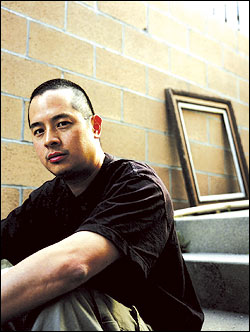Transatlanticism (Barsuk) is the newest and best album from Seattle indie rockers Death Cab for Cutie, the album the bandsinger/guitarist Ben Gibbard, multi-instrumentalist and producer Christopher Walla, bassist Nick Harmer, and drummer Michael Schorrhave been working steadily toward since forming in Bellingham six years ago. After the cassette-only You Can Play These Songs With Chords (reissued on CD last year) caught Northwest scenesters’ ears, Death Cab began gigging locally, eventually relocating to Seattle. Their next three releases1998’s Something About Airplanes, 2000’s We Have the Facts and We’re Voting Yes and the EP Forbidden Lovefleshed out their initial chiming, drifting sound. 2001’s The Photo Album was an even bigger leap forward, with Gibbard’s lyrics abandoning some of their head-in-the-clouds feel for a tougher outlook; the standout cut, “Styrofoam Plates,” is a painful but clear-eyed look back at an absentee father who “disgrace[d] the concept of family.”
Transatlanticism is even more muscular, with particular emphasis given to Walla’s guitar work. Gibbard has evolved into one of indie rock’s most soulful vocalists, and his lyrics have shed much pretense to their earlier lovelornness, from his looking through a hole in a woman’s dress in “Lightness” to the moment in “Tiny Vessels” that “You told her that you loved her but you don’t/You touch her skin and then you think/That she is beautiful but she don’t mean a thing to me.”
Just as importantly, in February Gibbard and electronic producer Jimmy Tamborello, aka Dntel, released Give Up (Sub Pop) under the name the Postal Service. Anyone who’s heard that album’s “Nothing Better”a deliberate answer record to the Human League’s 1982 synth-pop hit, “Don’t You Want Me”as well as Death Cab’s B-side cover of Bj�s “All Is Full of Love” is aware that Gibbard and Walla are keen-eared, widely knowledgeable music fans. The Jukebox took place in the Weekly offices on a Saturday afternoon shortly before Death Cab’s fall tour.
Jonathan Richman: “I Was Dancing in the Lesbian Bar” (1992) from I, Jonathan (Rounder)
Christopher Walla: I love Jonathan Richman.
Ben Gibbard: Me, too.
Walla: Have you ever met him before?
Seattle Weekly: No. He seems like a weird guy. I saw him outside a club in New York, pacing. He has a very serious demeanor by himself, and when he gets onstage, he’s a kid.
Gibbard: I saw him on that PBS documentary on the history of rock a few years ago, and the way he talks, he sounds like a complete drug casualty, but I don’t think he ishe has songs about not doing drugs and championing straightedge. I like Jonathan Richman for the same reason I like Jad Fair. They strip all the art out of music and have it be really to the point. They can sing about anything, the sillier the better.
SW: Do you ever try that yourself? Some of your lyrics have been fairly fantastical. The Death Cab stuff, especially on The Photo Album, is very straightforward, but the Postal Service and some parts of Transatlanticism are kind of whimsical.
Gibbard: I just bought the Jad Fair/ Teenage Fanclub record. I love it. I can listen to Jad Fair and Half Japanese in small doses. I sometimes think it would be really funny to have a song like [sings] “He’s got McDonald’s on the brain” or something like that, something kind of silly. But I think that kind of overly earnest thing only works when you have that kind of delivery. Jad Fair boils things down to very simple elements. I don’t think that would work with me.
Santana featuring Michelle Branch: “The Game of Love” (2002) from Shaman (Arista)
Walla: I know this song! That’s Carlos and . . . Gwen Stefani? No, Michelle Branch. [Branch hits song’s signature high note.] That note is so Auto-Tuned. I have to confess, I really love some Carlos Santana songs. It’s a good song, and I feel like I almost have to put up my dukes whenever I say that.
Gibbard: Yeah, I’m feeling this.
SW: People act like there’s a major difference between writing pop songs in a four-piece rock band and putting them out on an indie label and something like this.
Walla: And there really isn’t.
Gibbard: Chris and I have always been pop radio fans. More than ever, I just refuse to ever deny myself this kind of thing just because it happens to be on pop radio.
Walla: When I did a guest DJ spot on KEXP in the middle of the night, I threw on a song from the Justin Timberlake record, “Like I Love You.” You wouldn’t believe how many really angry e-mails we got at 3 in the morning. It was so insane. That song rocks! It’s so cool.
SW: It seems like there’s not that much openness to an all-music aesthetic in Seattleit’s very compartmentalized.
Gibbard: Totally. I think everybody goes through a phase, usually when they’re younger, where they want to identify with one style of music and wall off a lot of other music. And there’s a point where they admit they like something they were ashamed of before. It kind of opens the floodgates.
Walla: In the context, though, there was a John Vanderslice song on one side of [the Timberlake song] and something from one of the Library of Congress Alan Lomax records on the other. It was zero formatting: “These are a bunch of songs that I like.”
Justin Timberlake: “Rock Your Body” (2002) from Justified (Jive)
Gibbard: Fucking rules.
Walla: This record made me pull out [Michael Jackson’s] Off the Wall, and the really strange thingthat has never happened when that happensI actually put away Off the Wall and pulled this record back out. [laughs] I wanted more of it, and I knew there was more of it.
Super_Collider: “Gravity Rearrangin'” (2002) from Raw Digits (EFA/Caroline)
Walla: I think this is really cool. The way it’s built, and the space between the beats, it reminds me of middle-era Peter Gabriel, like some of the weirder stuff on So, the percussion blips that float in and out, and the way that some of this stuff is really dark and dry, and there’s other stuff that floats around the perimeter. I love stuff like this. It’s driving, but it’s not necessarily straight.
SW: They’re a British duo; Christian Vogel is usually a techno producer, and Jamie Liddell is kind of a soul vocalist. One thing I wanted to ask Ben about was the Superpitcher remix of the Dntel track you sang on before the Postal Service, “(This Is) The Dream of Evan and Chan.”
Gibbard: Oh, God, that’s my favorite one, I love it so much. I love that bassbump, bump, bump, bump, really low, it doesn’t resonate. I think that’s the first time outside of remixes [Chris] has done that any kind of electronic music has had my voice before. I put on [the remix CD] and came upon the Barbara Morgenstern oneit was really incredible, this person had made it into a duet. It was a strange realization: You can send a CD-R with two tracks of a voice and a bass line halfway around the world, and someone can build [a] totally new and exciting thing out of it.
SW: Chris, do you have any favorites of your own remixes? Is it something you enjoy doing?
Walla: I would like to do more of it. I don’t even have a computer, so it’s quite an ordeal when I do a remixit becomes a performancey sort of project. I’ve got a couple of Death Cab remixes floating around, and they’re ridiculous. They’re me and a couple of delay pedals, a bunch of drums, the vocal, and that’s it.
SW: Do you find yourself freed up any from working in a band?
Walla: No, because it’s not like I don’t like doing itit’s something you can always learn frombut it’s something that digital recording really lends itself to. You need to have an undo button in order to do a remix. It takes so long to get an element from somebody else’s thing onto a piece of tape that if it doesn’t work, you’re kind of fucked, and you have to start over. It’s really fun to try and do it within those limitations, but I’m not set up to do it.
Gibbard: I definitely think that analog recording for a rock band is the way to go. But it’s amazing to see how something that takes hours on tape can be done in a split second on a computer. Watching you turn the tape around, cutting and pasting a backwards thing . . .
Walla: But when you do a backwards thing on a hard drive, it can sound really good, but it’s not the same. It’s a different thing, especially when you start involving compressors and reverb and stuff.
The Black Keys: “The Moan” (2003) from split single (Suicide Squeeze)
Gibbard: I’ve heard this. It sounds live. I’ve been reading about them for a long time. I thought they might be harder, grittier.
Walla: It does sound like a small room, like it came from KEXP’s [in- station studio]totally guitar focused, like, “That guitar sounds great! The drummer, maybe not so much, but the guitar sounds great.”
Gibbard: It’s a bit surprising that it’s this band. I had this vision of them being far more down in the Delta.
SW: It’s interesting how a lot of so-called “blues-rock” indie bands basically sound like the Rolling Stones.
Walla: It’s true. There’s this Australian band I totally fell in love with when we were down there called the Mess Hall. It’s a little rockier than that, just guitar and drums and very Stones, pop songs sort of things.
Gibbard: It’s the right kind of swagger.
The Mountain Goats: “Fall of the Star High School Running Back” (2002) from All Hail West Texas (Emperor Jones)
Gibbard: [immediately] Oh, I love this album. All Hail West Texas, amaz-ing, probably my favorite Mountain Goats album.
SW:As an engineer, Chris, does a lo-fi recording like this drive you nuts?
Walla: I can’t listen to the Mountain Goats. I don’t mind lousy recordings until they get in the way of what’s happening. As much as I love some of the songs that are on, like, [Guided by Voices’] Bee Thousand or Alien Lanes, I listen to them just long enough to memorize them, and then when I want to listen to them, I just run them in my head.
Hall & Oates: “Private Eyes” (1981) from Private Eyes (RCA)
Gibbard: Ah! [Immediately starts playing air drums.] The best part about this song is that it’s just [stomps foot, mimes hitting snare] the whole songno fills, I don’t think any cymbals, just the straightest drumbeat there is.
Walla: I love the way this record sounds. The drum sounds are so awesome.
SW: You can tell it’s not a drum machine, it’s a live drummer. Ben, you wrote a piece about your Hall & Oates fandom for Pitchforkmedia.com.
Gibbard: Yeah. I love this song. I’ve said it once, I’ll say it again[Daryl Hall] is the greatest vocal ad-libber. He’s amazing. I love how they play the chorus out and he just goes. I’d love to be in the studio and hear the songs that didn’t make it [onto the albums]. I love this bridge; it’s modulating up and into the guitar solo. It’s a lot more complicated than anybody can really imagine. I played a solo show a year or so ago and said, “I’m gonna try and cover “One on One,” and I sat down with a guitar for hours and couldn’t figure out what the chord changes were. I’ve been doing this for some time; the more you do it, the easier to figure out, but I couldn’t. It was so subtle. There’s some music that’s really complicated, and you know it’s complicated when you put it on. It’s rare when something can be so complicated and sound so natural.
Death Cab for Cutie play the Showbox at 8 p.m. Fri., Nov. 21; 6 p.m. Sat., Nov. 22 (all ages); and 7 p.m. Sun., Nov. 23 (all ages). $13 adv./$15.








